Investors beware - the dismal days of September market performance are here.
September notoriously often leaves markets in negative territory. Since the start of the Dow Jones Industrial Average in 1896, the index has lost an average of 1.07% in September, with a 0.71% average gain for all other months.
That's a 1.78-point spread - enough to be "statistically significant at the 95% confidence level," and be considered a genuine pattern by statisticians.
More discouraging, the market has performed especially poorly in past Septembers when the preceding months were weak.
And that's where we are today.
August took markets on a wild ride. The Standard & Poor's 500 Index fell 5.7% and the Dow 4.4%. The month included two of the top ten worst-performing Dow days ever - a 635-point drop on Aug. 8 and a 513-point drop on Aug. 4.
Now with investors digesting a slew of disappointing economic reports, and the U.S. Federal Reserve unlikely to announce any stimulus measures until the end of the month at the earliest, it doesn't look like this September will buck the trend.
In fact, it could easily be worse.
30 Dismal Days Hath September
Investors tend to misidentify October as the worst month for stocks, but September has had its share of dismal days.
The Sept. 29, 2008 decline of 777.68points remains the single-biggest point drop ever. That freefall wiped out more than $1.2 trillion in shareholder wealth, the first time a single-day market loss exceeded $1 trillion.
And don't forget the Great Crash.
Back in 1929, September played a big role in the series of events that led up to the Great Crash and the sell-off that followed.
Indeed, after a six-year run that saw the Dow enjoy a fivefold increase, the index peaked at 381.17 on September 3, 1929. Stocks then fell for a month, losing 17% of their value on what historians now consider the "first leg" of the decline that presaged the Great Depression.
No one is exactly sure why September is such a bear for markets, but this one is on course to be filled with more down days.
Gloomy data from jobs, housing and manufacturing reports is dragging down consumer and investor sentiment after August's rocky market performance.
An ADP Inc. (Nasdaq: ADP) employment report released Wednesday said private-sector payrolls increased by a smaller-than-expected 91,000 in August. Economists had expected the ADP figure would rise by about 100,000. At the same time, the expansion for July was revised to 109,000 - down from a prior estimate of 114,000.
That follows a Monday report by payroll-processor Intuit Inc. (Nasdaq: INTU) that showed hiring slowed and employers reduced hours.
The non-farm payroll report coming out today (Friday) will likely show a weakening U.S. job market due to slowing manufacturing and nervous consumers. Consumer sentiment about the U.S. economy has steadily declined since February, and now is back to its lowest level in two years.
And housing data released Wednesday showed yet another price drop for that fragile sector.
September market performance could get a boost from the Fed if the central bank announces more quantitative easing, but that won't be before the conclusion of its two-day meeting on Sept. 21. If the Fed fails to implement QE3, the markets could take an even bigger hit.

"I expect this September to be rougher than normal in terms of volatility, but the Fed is probably going to tip its hand with regard to further stimulus," said Money Morning Chief Investment Strategist Keith Fitz-Gerald. "If we get more drugs for the addicts, some sort of knee jerk bounce is likely. No intervention will mean a quick drop because traders are preconditioned at this point that news bad enough to require more stimulus is somehow good news for market prices."
How to Prepare for Poor September Market Performance
Some investors think fleeing the markets is the best way to protect portfolios, but getting out only ensures that you'll miss profits.
Instead you need to know where to look in volatile times.
"I think investors need to be hunting for stocks that are largely isolated from fiscal nonsense and a recession," said Fitz-Gerald. "If they're beaten down and have a high income, even better. Timing never works, which is why you always want to play offense even if you are being defensive. Adjusting your playbook is a far better way to go."
To prepare you for a possible stock-market tumble, we've shared a number of defensive plays, including high-yield stocks, "glocal" companies, emerging-market stocks, and gold, silver and other precious metals.
But as some of you know, we've also gone a step further.
We've put together the best picks from our editors in the new daily Private Briefing column.
Private Briefing offers you not only market and economic analysis, but a daily detailed look at the best ways to profit and protect your portfolio. Executive Editor William Patalon III delivers a new idea each day that he's discussed with our team of financial experts.
So far Patalon's daily briefings have helped readers get in on a small biotech firm that jumped 25% in three days, a silver miner that climbed 7% in four days, and the gold hedge that protected investors from a 6% drop in the metal's price.
We don't just advise people what to do to protect themselves; we show them how to do it.
To learn more about Private Briefing, click here for a special report.
News and Related Story Links:
- Money Morning:
Key Indicators Point to a Rough September for U.S. Stocks
- Money Morning Video:
Three Picks for High Yield
- MarketWatch:
Looking at a scary September
- MarketWatch:
September is the cruelest month
- Bespoke Investment Group:
September Seasonality


